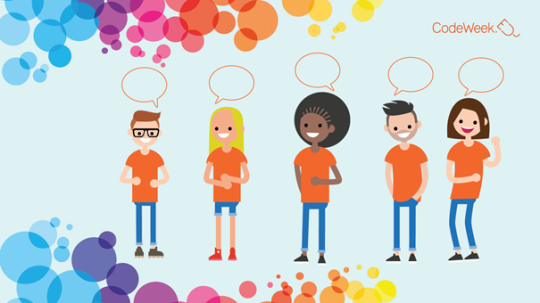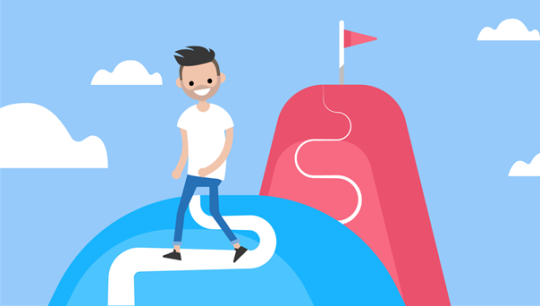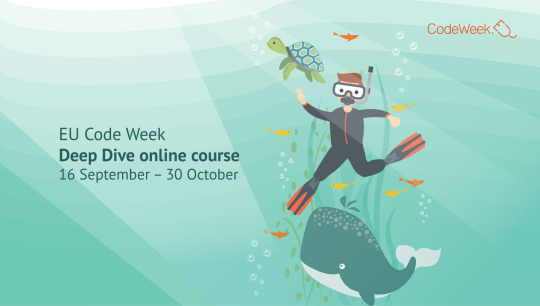Getting started with EU Code Week
Publication date: July 17, 2020
“Coding is like is a superpower that makes our ideas come true. But it is a peculiar superpower, because it is so human and democratic that everybody can acquire it and become a superhero of coding.”
Alessandro Bogliolo, EU Code Week Ambassador in Italy
What is coding?
Let’s start with the basics. In our digital age, literacy doesn’t only refer to reading or writing anymore; it must also include a variety of digital skills. It is, therefore, important for children, as well as for grownups to be able to understand technology. Learning coding at a young age helps develop crucial skills like problem-solving, analytical thinking, and collaboration, which prove to be very important in the long run.
So, what is coding?
Coding refers to writing a precise set of instructions that a computer can understand to execute an action – creating computer programming code. Coding is, therefore, the primary method for allowing intercommunication between humans and machines. Just like in interpersonal communication, in coding, there are also several languages, so-called programming languages. However, the main principles behind all programming languages are very similar.
Computational thinking describes a way of looking at problems and systems so that a computer can be used to help us solve or understand them. Computational thinking is not only essential to the development of computer programs and understanding programming languages but can also be used to support problem-solving across all disciplines and sectors.
If you want a more in-depth explanation, watch this video by Alessandro Bogliolo, Professor from the University of Urbino, to learn more about the history of coding.
What is Code Week?
EU Code Week is an initiative that was started in 2013 by a group of ambitious volunteers, programmers, coders, teachers, and entrepreneurs – individuals who thought it necessary that the European public had a basic understanding of coding. By 2017, the initiative had spread all over the continent, and in 2018, the European Commission supported the initiative as part of the Digital Education Action Plan, encouraging all schools in Europe to participate. Last year, the movement reached 4.2 million participants in more than 80 countries around the world, which brings us to this day. This year, Code Week will take place from 10 to 25 October, and the goal is to reach half of all schools in Europe, and for that, we need your help!
Who stands behind EU Code Week?
There is a large, active community standing behind EU Code Week that spreads over 80 countries and nationalities. In each of these countries, you can find support if any questions or need any help.
EU Code Week Ambassadors
The Code Week ambassadors are the people responsible for EU Code Week on a national level. They are the people you first turn to if you have any questions. You can find your country representatives here.
Leading teachers
The EU Code Week leading teachers are active teachers of the community who have a lot of experience organising coding activities. These Code Week veterans are the ones teachers turn to for best practices and tips on how to teach coding.
Edu coordinators
The Education Ministry coordinators have the task to coordinate Code Week activities within the national education system and help reach out to schools and teachers.

Need more? Watch this introductory video to learn even more about the movement.
What can EU Code Week offer to teachers, parents, and other coding enthusiasts?
EU Code Week offers various opportunities for teachers and parents.
#1 Have Fun
Having fun with your students or children is undoubtedly one of the most valuable benefits of Code Week. Coding makes lessons or homework more interactive and engaging by showing students another way of learning, by showing them how to not just repeat what is in the schoolbooks but by turning them into digital creators.
#2 Career boost
EU Code Week gives you access to professional development opportunities (webinars, workshops), which will contribute to energizing your career. Moreover, you will be able to gain recognition from both your students and your peers.
#3 Expand your network
The Code Week community is growing every day. Be part of an international community of like-minded teachers, parents, and learners, exchange ideas and learn from the experience of others.
In this video, you can already learn from the tips and best practices experienced teachers shared during the Icebreaker course. And don’t forget to join the Code Week Teachers’ group on Facebook.
#4 Gain access to coding resources
The EU Code Week website and all resources and learning materials for students, parents and teachers on it are available in 29 languages. This means that no matter whether you have previous experience with coding or not, whether you are fluent in English or not, you can easily access the information you need to get you started.
If you’re still finding your way around the Code Week website, watch this video by the Icebreaker course coordinator, Naír Carrera, where she gives an overview of all functions of the website.
#5 Leave a mark
The most important thing is that your children or students will be learning some key competences that will help them succeed in their personal but also professional lives while having lots of fun with you!
Code Week activities
Taking your first steps into coding might be challenging. Therefore, EU Code Week provides a variety of resources so that young learners can experiment with programming, using visual programming languages or activities that do not require any digital devices – called unplugged activities.
#1 Unplugged activities
The lockdown forced the whole school community to rethink the way teachers and students work and learn. And what better way of learning than having fun at home with your children while trying out some coding activities? Coding@Home is a series of video tutorials, quizzes, puzzles, and unplugged activities to try at home or anywhere else, for that matter. You can also check out this video and its lesson plans if you want to organise an unplugged activity.

#2 The EU Code Week map
To participate in Code Week, you must register your activity on the codeweek.eu website. Activities organised for the EU Code Week differ widely in topic, scale, participants, organisers, and goals. For teachers, this can be a classroom lesson involving any innovative tool or approach – ask your students to create a game with Scratch to learn about Romanticism or create a quiz app to learn the capitals of different countries – up to you. Browse through this Padlet for more ideas.
All activities are displayed on the Code Week interactive map, where you can gain inspiration or participate in others’ activities.
Spoiler alert: This year, we are adding a calendar of featured coding events, co-hosted by partner organisations free of charge and available to everyone, so stay tuned!
#3 The Code Week 4 All challenge
If you need an even more exciting opportunity to develop your coding skills, take part in the Code Week 4 All challenge. The Code Week 4 All challenge encourages you to link your activities with others organised by friends, colleagues and acquaintances, and together gain the Code Week Certificate of Excellence. All you need to do is register at least 10 activities from 10 different organisers or connect with organisers from two other countries and join your activities.
This tutorial will walk you through registering a Code Week 4 All activity, step by step.
#4 Hour of Code
If you are a beginner with no experience in coding, Hour of Code is a great option to start. The Hour of Code gives learners a first introduction to computer science. It offers hundreds of one-hour activities in over 45 languages for students of all grades. The activities require no experience and can be run on browsers, tablets, and smartphones. You do not need to create an account – just visit the website and take one Hour of Code.
This is only a brief introduction to the world of Code Week. Interested to learn more? Join our free in-depth online course, which starts on 16 September.

Join our community on Facebook, Twitter and Instagram for regular updates on new activities and courses.


